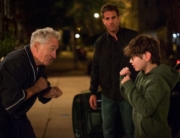The subtle and profound dual character study A Real Pain is a triple showcase for Jesse Eisenberg, who shines as a star, director, and screenwriter. If this sounds like a blatant act of narcissism, it’s worth noting that Eisenberg—who directs with a clean, unpretentious vision—is more than comfortable sharing the spotlight with co-star Kieran Culkin, who delivers one of the stellar performances of the year.
Cousins David (Eisenberg) and Benji (Culkin) reconnect through a trip to Poland, fulfilling a promise made to their grandmother to visit the country she left after surviving the concentration camps. As third-generation descendants of Holocaust survivors, the cousins have a distant, casual relationship with their family history and Jewish heritage. They’re simply two New Yorkers raised on Long Island, sharing the same upbringing, privileges, and opportunities, yet they couldn’t be more different.
A Real Pain unfolds as a road movie, charting David and Benji’s journey through Poland, including a stop at the Majdanek concentration camp and the house where their grandmother once lived. The journey enriches what is, more prominently, a classic odd-couple tale about two divergent personalities on a collision course the longer they spend time together. The blend of humor and drama is a feat, proving that with his sophomore feature, Eisenberg is just as talented behind the camera as he is in front of it. (His underwhelming debut, When You Finish Saving the World, was easily forgettable.)
David and Benji are the kind of cousins (and friends) with a bond so intimate and a shared fabric of memories so strong that it can’t be easily dissolved, despite the distance in their adult lives. Benji is more demonstrative, frequently bringing up shared childhood experiences (like reminding David how much he used to cry). David, however, is overwhelmed by Benji’s constant overflow of emotions, lack of caution (telling the tour guide how to do his job), and disregard for rules. Yet, precisely because they know each other so well, the mix of affection and resentment between them means they can’t be hypocritical: They must confront the grievances and memories that define their relationship.
Accompanying them is an eclectic group on the same tour: a retired couple reconnecting with their heritage (Daniel Oreskes and Liza Sadovy); a recently divorced woman still reeling from her ex-husband’s abandonment (Jennifer Grey); and a Jewish convert from Rwanda (Kurt Egyiawan), who escaped unspeakable horrors and is now exploring the devastating history of the Holocaust. Egyiawan’s character is a clear example of suffering that’s hard to compare with others’. Yet Benji, sweet, vulnerable, and impulsive, is like a constantly burning match—troubled by his inexplicable pain but lighting up every room, taking up all the oxygen while everyone else feels diminished. His presence is simultaneously addictive, repellent, empathetic, and selfish—a fascinating, walking contradiction.
Benji is both a blessing and a burden. The tour group appreciates his adventurous and creative spirit, like when he encourages everyone to pose alongside statues commemorating the Warsaw Uprising as if it’s part of a game, while David snaps photos without joining in. But the group is less receptive to Benji’s outburst on a train, where he accuses them of insensitivity and indifference for not recognizing how strange it is to travel like cheerful, carefree tourists to a concentration camp. Nothing better illustrates the weight Benji represents to others than the moment David finally vents to the group—without Benji present—about his cousin’s past. It’s a moving scene that allows us to empathize with both men. Navigating personal pain is hard enough, but sharing it with the world is even more daunting. More difficult still is the ability to listen to and endure the pain of others.
Succinct and emotionally rewarding, A Real Pain draws a line of compassion between the historical grief represented by the Holocaust and the intimate, individual burdens of the cousins. Sometimes we need a slap, sometimes a warm embrace, and sometimes to acknowledge and express feelings that shouldn’t be ignored.







Leave A Comment